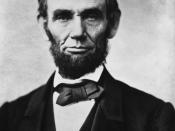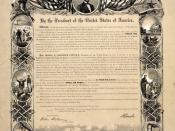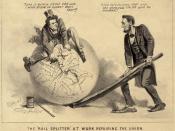Even from the time Abraham Lincoln was a twenty-eight year old legislator, his views on slavery were strong--he was completely against it. He felt it was "founded on both injustice and bad policy." Abraham Lincoln was elected president in November of 1860. The issue of slavery divided the nation into two--the North and the South, leaving the President with a tumultuous task at hand. Even though his personal beliefs may have led him in one direction, they needed to be filtered in order to appease both the North and the South. Despite Lincoln's profound hatred for slavery and all that came with it, he accepted it where it already existed. It would be counterproductive to make his true feelings about slavery publicized. In Lincoln's inaugural address, he asked the Southerners to remain part of the Union. A country divided in two was not something that the new president was ready to deal with.
He was not prepared to plead with secessionists.
Lincoln said that all knew that slavery somehow caused the Civil War. The radical members of Lincoln's party urged him to emancipate all slaves immediately. His political side coerced him to wait it out. If he freed the slaves too hastily, the Border States would join the Confederacy. If he waited too long, the doors of opportunity would be closed forever, perhaps never to allow the freedom of slaves again.
At the end of the summer of 1862, Lincoln stated, "When the rebel army was at Frederick, I determined, as soon as it should be driven out of Maryland, to issue a proclamation of emancipation. . . . I said nothing to anyone; but I made a promise to myself and . . . to my Maker." Lincoln despised slavery. He bit his tongue but he could never silence...



Good essay
This essay is really good. Check out my essays.
0 out of 0 people found this comment useful.